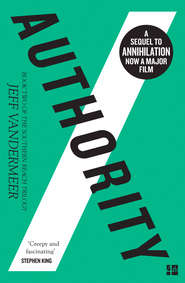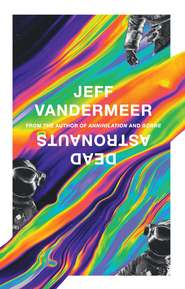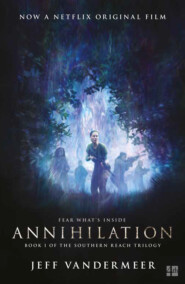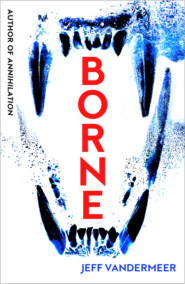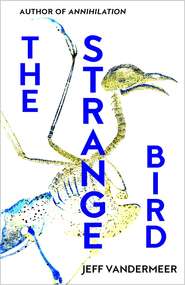По всем вопросам обращайтесь на: info@litportal.ru
(©) 2003-2024.
✖
Acceptance
Настройки чтения
Размер шрифта
Высота строк
Поля
The opening leading into darkness resembles a maw more than a passageway, the underbrush around it pushed back, squashed in a rough framing circle, as if some now-absent serpent had once curled around it in a protective mode. The stairs form a curling snarl of crooked teeth, the air expelled smelling of thick rot.
“I can’t go down there,” Whitby says, in such a final way that he must be thinking that in the descent he would no longer be Whitby. The hollows of his face, even in that vibrant, late-summer light, make him look haunted by a memory he hasn’t had yet.
“Then I’ll go,” you offer—down into the gullet of the beast. Others have, if rarely, and come back, so why not you? Wearing a breathing mask, just to be safe.
There is a dazed panic and coiled restraint behind your every movement that will come out later through the flesh, the bone. Months from now you will wake sore and bruised, as if your body cannot forget what happened, and this is the only way it can express the trauma.
Inside, it’s different than in the fragmentary reports brought back by other expeditions. The living tissue curling down the wall is almost inert, the feeble wanderings of the tendrils that form the words so slow you think for a moment it’s all necrotic tissue. Nor are the words a vibrant green as reported but a searing blue, almost the color of a flame on a stove top. The word dormant comes to mind, and with it a wild hope: that everything beneath you will be inert, normal, even if at the outer boundary of what that word means.
You keep to the middle, do not touch either wall, try to ignore the shuddering breath of the tower. You don’t read the words because you have long seen that as a kind of trap, a way to become distracted … and still the sense that whatever will disorient and destabilize lies below you, deciding whether to be seen or remain unseen—around a corner, beyond the horizon, and with each new empty reveal, each curve of the steps lit by the blue flames of dead words, toward an unknown become shy, you are wound ever tighter, even though there is nothing to be seen. The hell of that, the hell of nothing at all, which feels as if you are reliving every moment of your life at the Southern Reach—descending for no reason, for nothing, to find nothing. No answers, no solution, no end in sight, the words on the wall not getting fresher but darker, seeming to wink out as you come upon them … until, finally, you glimpse a light far, far below—so far below it’s like a glowing flower in a hole at the bottom of the sea, a glimmering, elusive light that through some magician’s trick also hovers right in front of your face, giving you the illusion that you can reach out and touch it if you only can find the courage to extend your hand.
But that’s not what makes your legs ropy, a rush of blood surging through your brain.
A figure sits hunched along the side of the left-hand wall, staring down the steps.
A figure with head bowed, turned away from you.
A prickling engulfs your head under your mask, a kind of smooth, seamless insertion of a million cold, painless needles, ever so subtle, ever so invisible, so that you can pretend it is just a spreading heat against your skin, a taut feeling across the sides of your nose, around your eyes, the quiet soft entry of needles into a pincushion, the return of something always meant to be there.
You tell yourself this is no less or more real than bowling at Chipper’s, than the hippo with the red paint under the skin, than living in Bleakersville, working at the Southern Reach. That this moment is the same as every other moment, that it makes no difference to the atoms, to the air, to the creature whose walls breathe all around you. That you gave up the right to call anything impossible when you decided to enter Area X.
You come closer, drawn by this impossible thing, sit on the step next to him.
His eyes are shut. His face is illuminated by a dark blue glow that emanates from within, as if his skin has been taken over, and he is as porous as volcanic rock. He’s fused to the wall, or jutting out from it, like an extension of the wall, something that protrudes but might be retracted at any moment.
“Are you real?” you ask, but he says nothing in reply.
Reaching out to him, extending a trembling hand, awestruck by this apparition, wanting to know what that skin feels like, even as you’re afraid your touch will turn him to powder. Your fingers graze his forehead, a rough, moist feel, like touching sandpaper under a thick layer of water.
“Do you remember me?”
“You shouldn’t be here,” Saul Evans says under his breath. His eyes are closed; he cannot see you, and yet you know he sees you. “You need to get off the rocks. The tide’s coming in.”
You don’t know what to say. You won’t know what to say for a long time. Your reply was so many years ago.
Now you can hear the vast, all-consuming hum of some mighty engine from below, the swift revolving of strange orbits, and the light below, that impossible flowering light, is fluctuating, shifting, turning into something else.
His eyes snap open, white against the darkness. He’s no different than when you last saw him, has not aged, and you’re nine again and the light below is coming up toward you, coursing up the steps toward you, fast, and from above you can hear the distant echo of Whitby screaming, from the top of the tower, as if he’s screaming for both of you.
0004: THE LIGHTHOUSE KEEPER (#ulink_373f7757-0ebc-57ee-af26-985b8c438e67)
Armadillos ruining the garden, but don’t really want to put out poison. Sea grape bushes must be pruned back. Will make a list of maintenance issues by tomorrow. Fire on Failure Island, but already reported and not major. Sighted: albatross, unidentified terns, bobcat (peering out of the palmetto grove to the east, staring at a hiker who didn’t see him), flycatcher of some kind, pod of dolphins headed east in a frenzy as they chased a school of mullet through the sea grass in the shallows.
Bodies could be beacons, too, Saul knew. A lighthouse was a fixed beacon for a fixed purpose; a person was a moving one. But people still emanated light in their way, still shone across the miles as a warning, an invitation, or even just a static signal. People opened up so they became a brightness, or they went dark. They turned their light inward sometimes, so you couldn’t see it, because they had no other choice.
“That’s bullshit,” Charlie said during the night, when Saul expressed something similar to him, after they’d had sex. “Don’t ever become a poet.” For once, Saul had convinced Charlie to come to the lighthouse, a rare event because Charlie still had a skittish, flighty quality to him. Beaten by his father and kicked out by his family, and in the twenty years since he’d not entirely come out of his shell. So this was a halting step forward—something that made Saul happy, that he could provide a small sense of security.
“An idea in one of my father’s sermons. The best he ever gave.” Flexing his hand, trying to sense any residual discomfort from the incident with the plant. None to be found.
“Ever miss it? Being a preacher?” Charlie asked.
“No, I’m just working out something about the Light Brigade,” he said. They still elicited in him a distant but sharp alarm. What were they projecting that he couldn’t see?
“Oh, them, huh?” Charlie said with a simulated yawn as he turned over on his back. “You can’t leave those Brigaders alone, can you? Bunch of crackpots. You, too.” But said with affection.
Later, when he was drifting off, Charlie murmured, “It’s not stupid. The beacon thing. It’s kind of a nice thought. Maybe.”
Maybe. Saul found it hard to tell when Charlie was sincere about such things. Sometimes their life between the sheets seemed mysterious, to have no relationship to life out in the world.
Sometimes, too, other people gave you their light, and could seem to flicker, to be hardly visible at all, if no one took care of them. Because they’d given you too much and had nothing left for themselves.
At the end, with his church, he’d felt like a beacon that had been drained of light, except for some guttering glimmer in the heart of him—the way the words shone out from his mouth, and it almost didn’t matter what light they created, not to his congregation, because they were looking at him, not listening. At best, anyway, his ministry had been an odd assortment, attracting hippies and the straitlaced alike, because he’d pulled from the Old Testament and from deism, and the esoteric books available to him in his father’s house. Something his father hadn’t planned on: the bookshelves leading Saul to places the old man would rather he’d never gone. His father’s library had been more liberal than the man himself.
The shock of going from being the center of attention to being out of it entirely—that still pulled at Saul at unexpected times. But there had been no drama to his collapsed ministry in the north, no shocking revelation, beyond the way he would be preaching one thing and thinking another, mistaking that conflict, for the longest time, as a manifestation of his guilt for sins both real and imagined. And one awful day he’d realized, betrayed by his passion, that he was becoming the message.
By the time Saul woke up, Charlie was gone, without even a note. But, then, a note might have seemed sentimental, and Charlie was the kind of beacon that wouldn’t allow that kind of light.
In the afternoon, he saw Gloria walking up the beach, waved to her, wasn’t sure she’d seen him until she corrected her course to slowly tack closer. It wouldn’t do to seem too interested in talking to him, he knew. Might violate some girl code.
He was filling in holes from armadillos that had been rooting around in the garden. The holes, which roughly matched the shape of their snouts, amused him. He couldn’t say why. But the work made him happy in a formless, motiveless way. Even better, the twins, Henry and Suzanne, were very late.
It had become a stunning day after a cloudy start. The sea had an aquamarine sheen to it, vibrant against the dull shadows of submerged seaweed. At the very edge of a seamless, ever-deepening blue sky, the contrail of an airplane, showing its disdain for denizens of the forgotten coast. Much closer to home, he tried to ignore rocks slick with the white shit of cormorants.
“Why don’t you do something about those armadillos?” Gloria asked when she’d finally reached the lighthouse grounds. She must have meandered, distracted by the treasures to be found in the seaweed washed up on the beach.
“I like armadillos,” he told her.
“Old Jim says they’re pests.”
Old Jim. Sometimes he thought she made up a reference to Old Jim every time she wanted to get her way. Old Jim lived down one of the dozens of dirt roads, at the end of a maze of them, in a glorified shack near an illegal drop site for barrels of chemical waste. No one knew what he’d done before he’d washed up on the forgotten coast, but now he served as the ad hoc proprietor of the on-again, off-again village bar.
“Is that what Jim says, huh?” Making sure to pack the soil tight, even though he was already feeling strangely tired. Another storm and he’d have eroded divots all over instead.
“They are armored rats.”
“Like seagulls are winged rats?”
“What? You know, you could set traps.”
“They’re much too smart for traps.”
Slowly, staring at him sideways: “I don’t think that’s true, Saul.”
When she called him Saul, he knew he might be in trouble. So why not get in a lot of trouble. Besides, he needed a break, was sweating too much.
“One day,” he said, leaning on the shovel, “they got in through the kitchen window by standing on top of each other and jiggling the latch.”
“Armadillo pyramid!” Then, recovering her youthful caution: “I don’t think that’s true, either.”






